Time to Read the (Eastern) Classics
Last updated: 4/12/2025 | Originally published: 4/12/2025
As promised last time: more classics! To keep this one manageable, I’ve kept it to just East Asian classics, which makes up the bulk of the non-western classics I’ve read. Next week I will be back to shorter essays!
Analects
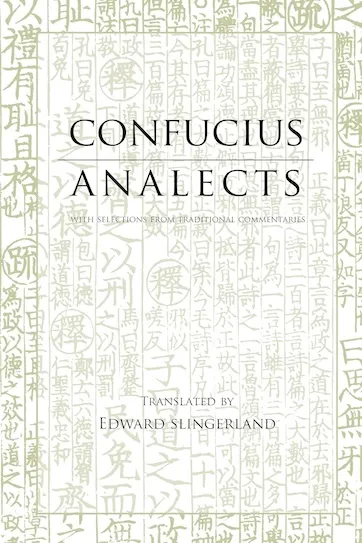
We start with the great-granddaddy of them all — the Analects, aka the Lunyu, aka the sayings of Confucius. Yes, this is the source of all those “Confucius says” memes.
The Analects is surprisingly fun for a text on philosophy and political theory. That’s partly because the book is mostly written in short anecdotes, describing a quip Confucius made or a story he told, which keeps the book moving along. But it’s mostly because you get a very strong sense of Confucius as a character, for lack of a better term. The Analects paints a very clear portrait of a slightly grumpy old man who’s annoyed that nobody will listen to him even though he knows all the answers, surrounded by tryhard students who all almost get it… but not quite. It’s really quite charming!
I read Edward Slingerland’s translation for Hackett, which I especially recommend because it provides context for nearly every paragraph. (In general Hackett is a good source for translations of ancient Chinese philosophy.) As a companion volume, I highly recommend Hackett’s Introduction to Classical Chinese Philosophy, which accessibly walks through early Confucianism, Moism, and Daoism.
Mengzi
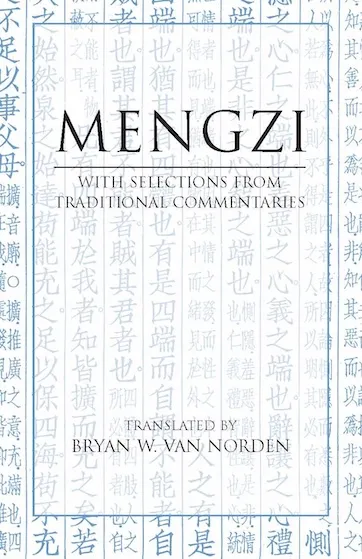
So if you read the Analects, you really have to read the Mengzi as well. That’s because Mengzi “won”, in some sense — his interpretation of Confucianism is how Confucianism has been traditionally understood for two thousand years, and Neo-Confucianism qua Zhu Xi raised him to almost the same level as Confucius himself.
But Mengzi is just not as interesting a character as Confucius. He’s a little too goody-two-shoes, a little too clever. And, ultimately, he’s saying a lot of the same things, with subtle (though important) differences. So it’s hard to recommend the Mengzi unless you’re really interested in Confucianism — I’m glad I read it, but it’s not exactly fun.
I read the Bryan W. Van Norden translation from Hackett, which is very readable and comes with extensive footnotes (which often cite Zhu Xi, natch). Conveniently, that’s the same Van Norden that wrote the Introduction to Classical Chinese Philosophy above; his chapter on the Mengzi echoes a lot of what he says in the introduction.
Dao De Jing
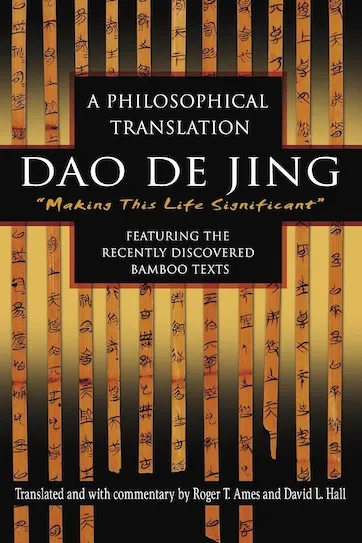
The Dao De Jing: the misinterpreted classic beloved by mystics and anarchists everywhere.
But look: fundamentally, we can’t really make sense of what the Dao De Jing is “really” saying. Even Han Dynasty commentators couldn’t make sense of what the Dao De Jing is really saying, either! We only realized like 30 years ago that the canonical text might be accidentally reversed (??). We kinda just have to accept that any translation is going to import a lot of assumptions.
So I read the Ames and Hall “philosophical translation”, which I gather is somewhat idiosyncratic, but relatively thoughtful. I also read a few chapters from Brook Zipporyn’s more recent translation, which felt somewhat more readable.
But in either case, the Dao De Jing is basically the ancient Chinese equivalent of ancient Mediterranean Wisdom literature — lots of short, gnomic pronouncements that are either blindingly obvious or very profound (depending on the verse and your viewpoint) — which is of interest but difficult to tackle from a modern standpoint.
Zhuangzi
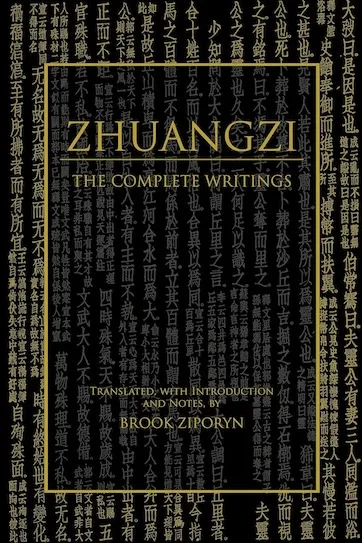
The Zhuangzi sounds like a philosophical work I’d appreciate, but frankly, every time I’ve tried to read it I’ve gotten so confused two chapters in that I just gave up. So I really don’t have much to say about it!
I have the Brook Zipporyn translation for Hackett, which I understand is the best English-language scholarly translation. But it’s almost too scholarly — even if I understand the introduction, I can’t really make heads or tails of what Zhuangzi is supposedly saying 😅 Oh well, maybe this year is the year I’ll power through it…
The Lotus Sutra
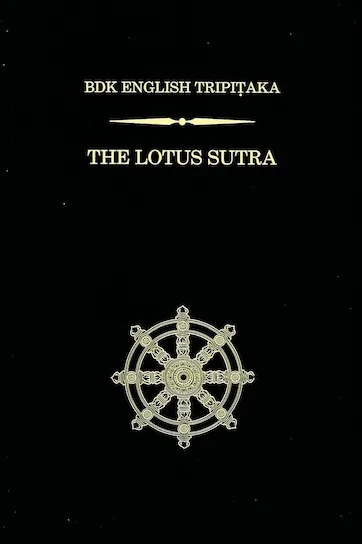
The Lotus Sutra is one of the big texts of Mahayana Buddhism, and in particular it’s the main text of Nichiren Buddhism. (You might know Nichiren Buddhism because Sōka Gakkai is, more or less, a Nichiren sect.) It’s also maybe the only Buddhist text I’ve read cover-to-cover (besides, like, the Heart Sutra).
Now the Lotus Sutra is a very important, influential religious text, but you should not read it cover-to-cover for that reason. You are probably better served by something like Donald S. Lopez Jr’s The Lotus Sutra: A Biography, which explains its teachings in a historical context as well as the history of the book itself.
That said, the Lotus Sutra does have a lot of famous parables and (more importantly for my purposes) a lot of very neat cosmic imagery (Buddhist stupas flying through the sky and the Buddha shooting a ray of light through millions of worlds and so on) which you will miss in most summaries. Also prevalent (and perhaps especially interesting) is the Lotus Sutra’s absolute obsession with its own authenticity and authority. It repeatedly states that if you disparage the Lotus Sutra, you will be reborn in hell for billions of years (!).
I read the translation from BDK America which I saw recommended many years ago as a particularly attentive translation (being produced by a religious group and all).
Three Kingdoms
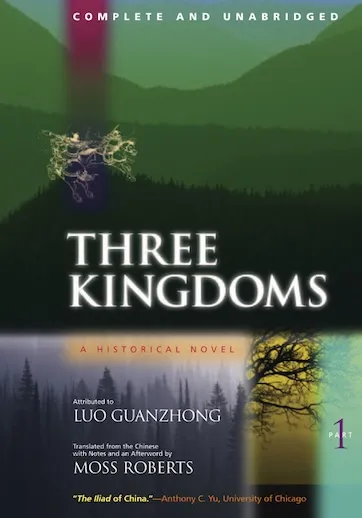
So obviously Three Kingdoms is one of the Four Great Chinese Novels™️ and almost certainly the most culturally influential of the four (maybe tied with Journey to the West). It’s one of those stories that a significant fraction of the world’s population just knows.
Luckily there is a complete, unabridged, fairly idiomatic translation by Moss Roberts1 — my understanding is that this is the de facto standard English translation. It clocks in at around a thousand dense pages, so it’s definitely not a beach read.
Parts of Three Kingdoms are really fun! There’s a reason characters like Cao Cao and Zhuge Liang and Guan Yu are household names, and why stories like the Peach Garden Oath are literally proverbial, and why Three Kingdoms is readapted every three years. Some of the most fun parts are not things you’d pick up from a summary (Zhao Zilong’s ahem devotion to Liu Bei…). It has the kind of continent-and-generation-spanning scope you’d otherwise only see in long Western fantasy series like A Song of Ice & Fire.2
But… if you have the opportunity, learn Three Kingdoms through cultural osmosis. (I get the sense that most Chinese folks “just know” the stories from various adaptations and haven’t actually read the original.) It is very much a medieval romance3, not a modern literary novel, and that means there’s little interiority or characterization and most of the action is described in a detached, nondescript style. Most of the novel is closer to a historical (albeit heavily fictionalized) chronicle than what we moderns would consider literature. Some of that has to do with Chinese storytelling conventions, but Three Kingdoms feels noticeably less “modern” than, say, Jin Ping Mei or Hong Lou Meng. That’s not necessarily an issue — we read the classics, in part, to experience other storytelling styles — but maintained over more than a thousand pages… yeah, it’s rough to get through.
Also… Three Kingdoms basically refuses to acknowledge the existence of women. Like, over the course of something like a thousand pages and hundreds of named characters, there’s only 4 or so named women, only two of whom matter to the plot (although one of those is a badass, so), and one of whom is introduced just to be cannibalized by her husband (!). Now a lot of these classics are uhh not progressive, and again I think there’s a lot of value in reading books not exactly in line with our modern values — but at some point it starts to feel strange just how much Three Kingdoms goes out of its way to avoid mentioning the gender that makes up half the population, even incidentally.
Investiture of the Gods, aka Fengshen Yanyi
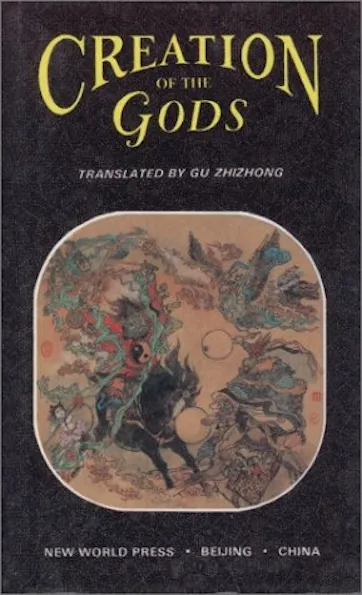
Fengshen Yanyi, usually translated as Investiture of the Gods or Creation of the Gods, is not typically listed among the important Chinese classics — it’s not considered one of the Four Great Chinese Novels™️, for instance. However, it is fairly important. A lot of famous scenes — King Zhou insulting Nüwa, Daji the fox spirit, Jiang Ziya fishing with a straight hook, Bi Gan making a fox-skin coat and losing his heart, and Nezha killing Ao Bing — are “canonically” from Fengshen Yanyi. In particular, Ne Zha and its sequels / spinoffs are all (very loosely) based on Fengshen Yanyi.
So, obviously, I wanted to read it. Surprisingly, though, there is only one (1) English-language translation, published around 2000 (helpfully, this site has a link to the PDF). It is, uh, rough — it is very much a product of late-90s China, with nothing sounding quite idiomatic, and it’s quietly abridged without comment.
But, frankly, translation notwithstanding, I cannot recommend Fengshen Yanyi. It is (like Three Kingdoms) very much a medieval romance, and it is (like Three Kingdoms) very, very long. Unlike Three Kingdoms — which at least follows a consistent-ish set of characters and has at least a few truly engaging scenes — Fengshen Yanyi jumps between characters and plotlines with abandon, with very little to show for it. For instance, there’s also a rivalry between different schools of Daoism that is never introduced or explained — even the translator’s introduction basically shrugs and says “yeah this is probably a veiled reference to a real Daoist political struggle in the late Ming Dynasty”. The whole thing feels like the final scene of an MCU movie — all the characters lining up to beat the snot out of each other — without any of the preceding character development.
Just read decent summaries of the bits you’re interested in or, better yet, just watch Ne Zha and its sequels.
Monkey King
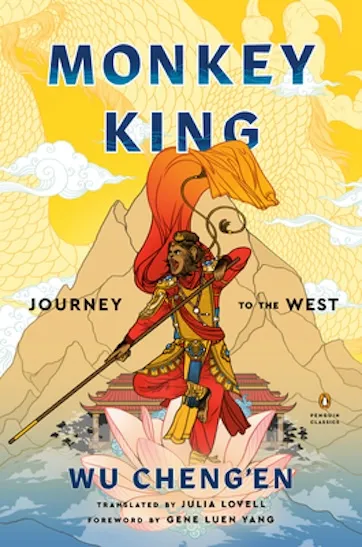
“Don’t you mean Journey to the West?” I do, somewhat, but specifically I read Julia Lovell’s heavily-abridged translation for Penguin Classics. She closely translates the beginning and end of the novel, but heavily truncates the middle, picking a few key plotlines to follow so that it falls around standard Western novel length.
Monkey King works pretty well as a breezy, superhero-ish adventure story, so if you’re not looking for scholarly accuracy I can recommend this volume. (Note that I’ve read good reviews overall, but Van Norden [see above] once gave an interview where he got a little snippy about Lovell’s translations, so… take that as you will 😉) But I definitely can’t say I’ve read Journey to the West — for that, I would probably need to go to the canonical Anthony C. Yu unabridged translation.
The Peach Blossom Fan
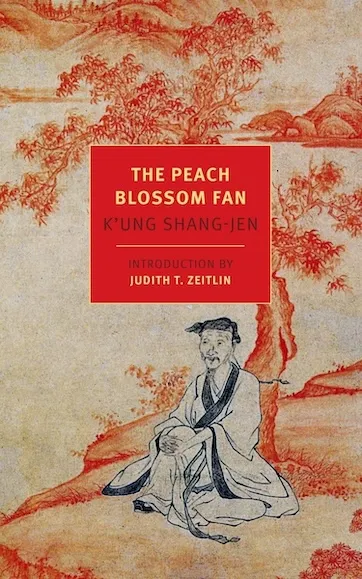
The Peach Blossom Fan is very, very good!
A long play dramatizing a doomed romance against the backdrop of the fall of the Ming Dynasty written by a direct descendent of Confucius (doesn’t that description alone make you want to read it?), I don’t think The Peach Blossom Fan is particularly well-known among the English reading public. Which is a shame, because, as I said, it is very, very, good! It’s easily my favorite of everything listed here.
Until a few months ago, the one warning I would have is that the only English translation is rather aged and in particular uses Wade-Giles romanization, which I personally find very distracting.
However, OUP just published a new translation, to which the Complete Review gave a glowing review. So perhaps I will pick that one up at some point.
The Nine Cloud Dream
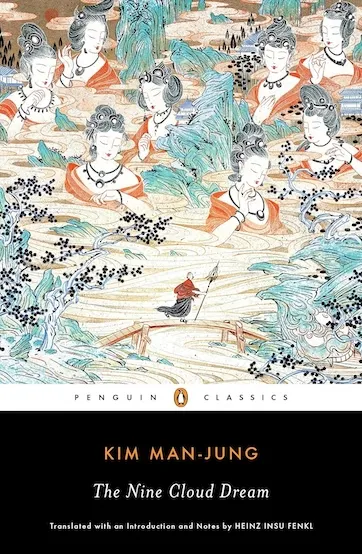
I only read this because it’s one of the most recent releases from Penguin Classics. Allegedly it’s a major Korean classic although personally I had never heard of it before.
It opens with a Buddhist monk in the Tang dynasty who accidentally breaks his vows by flirting with nine fairies. His master, annoyed, bonks him on the head and he passes out.
… whereupon he wakes up in a harem anime, in which he is the perfect Confucian gentleman who passes the imperial examinations with top marks, becomes the emperor’s personal bestie, and defeats the marauding barbarians on the battlefield, before retiring to collect concubines (the reincarnated fairies, natch).
Then in the last chapter (spoiler alert?) he dies and wakes up as a Buddhist monk again, and realizes that life is impermanent. The end.
One Goodreads review4 called it a “Confucian male power fantasy hastily disguised as a Buddhist fable” and I cannot disagree. I wish I liked it, but frankly unless you are looking for a Confucian male power fantasy (which, in fairness, is a pretty interesting cultural object!), I’m not sure I can recommend it.
Also, the translation is a bit… odd. It’s pretty solid, but the introduction does point out that there’s a lot of wordplay and symbology in the original that’s difficult-or-impossible to translate, so most of that is missing. Also, they made the… interesting… choice to use old-timey Wade-Giles transliterations of all the Chinese names, apparently to make it feel archaic, just the way Classical Chinese would have felt in the Joseon dynasty. Personally I found that incredibly distracting.
The Song of Kieu
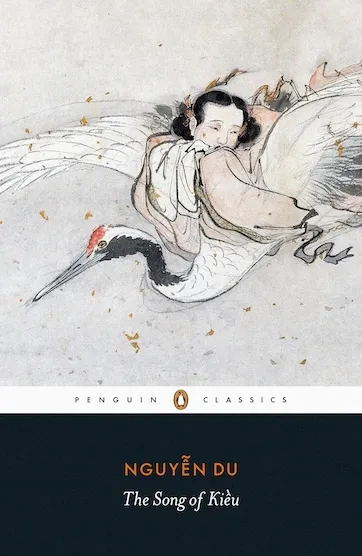
The Song of Kieu (also sometimes translated The Tale of Kieu) is a (the?) great classic of Vietnam — it’s referenced in both Trinh T. Minh-ha’s Surname Viet Given Name Nam and Viet Thanh Nguyen’s The Sympathizer! So needless to say I was excited to read it.
Kieu is the story of the eponymous woman (based distantly on a real Chinese woman from the Ming dynasty) bouncing from one set of tragic circumstances to another and, basically, being sad about it. It reminded me of nothing more than Madeline Miller’s Circe, which is high praise.
But also: I’m not sure I really got the intended experience? The Penguin Classics edition was translated by a Brit whose only apparent connection to Vietnam is that he spent a few years there with the Peace Corps (?). The introduction spends pages explaining the evolution of the story from the Ming Dynasty-era historical events that inspired it, but then barely touches on its relevance to Vietnamese culture.
So while I would recommend Kieu, I would like to read it again, perhaps in the Huynh Sanh Thong translation.
Footnotes
-
Here it is on the Internet Archive for some reason! ↩
-
It is definitely not surprising that Game of Thrones is probably the most popular Western television show in China. ↩
-
Although, of course, if you know what a “medieval romance” is and find a comparison to the Alexander Romance useful, you probably don’t need to read this article. ↩
-
That, alas, I cannot find a reference to anymore. ↩